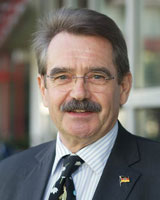Erhard Hackler, Deutsche Seniorenliga
Erhard Hackler is a lawyer and executive director of the Deutsche Seniorenliga e.V. (German Seniors League), one of the leading interest groups for the fastest growing population group in Germany.
Mr. Hackler, the German Seniors' League was founded in 1993 in the context of family care. How did it come about that the topic was already on the agenda almost 30 years ago?
The aging of the population was already foreseeable at that time, but the effects were still far in the future. Therefore, only a few institutions have actively addressed the issue. In contrast, the founders of the Seniors' League recognized the need to act with foresight. Because one thing was already clear back then: the majority of those in need of care will have to be cared for at home by relatives.
How has the care situation changed from 1993 to 2022?
Let's start with what hasn't changed: the main burden of care is borne by women in our society, as wives, but also as daughters, daughters-in-law or sisters.
And that's where the difference lies: in the past, fewer women were employed. A large number of women who provide care today are or have been employed. Many working people have had to reduce or even give up their jobs due to the tasks of nursing. Although the concept of family care leave has improved a lot, there is still a lot of room for improvement when it comes to reconciling family and work. This also applies to the losses that caregivers suffer in their pay-as-you pension.
Statutory long-term care insurance in Germany is very good, even when compared internationally. Where do you still see potential here?
Long-term care insurance offers a wide range of support, and the definition of the need for long-term care has also been improved by the five levels of care.
But this is also where the challenge for family caregivers lies. We have a very complex, sometimes opaque system that overwhelms many caregivers. It starts with determining the level of care and ends with the procurement of aids. A small-scale process chain that caring relatives have to go through independently and alone during the often emotionally stressful time of care. This overwhelms many, and so some services are used only little or not at all; an example is preventive care.
We need better caregiver support in this regard.
Digitization is a given topic and has arrived in many areas of daily life. What about the digitization of home care?
Wa as the German Seniors' League, have been doing our part in our public relations work since 2000 so that older people "are not only connected, but also activly using the opportunities".
However, we have also noticed that digitization in particular makes lifelong learning necessary. Here we demand more support for older people from politicians and at the same time demand and promote the willingness to seize digital options. And this is where it gets really exciting.
With the Digital Care Act, we see a trend towards supporting patients with prescribable digital offers, and we welcome that. But without the potential users, most of whom are “occasional users”, supporting the development and everyday use, the success of these “DIGAs” will be limited. The reason for this is wrong assumptions during the development, and additionally the insufficient support for the application in everyday life.
In our opinion, this will also be the case with the digital care applications that are currently being developed. The lack of understanding can very easily lead to digital solutions not relieving, but burdening, as they overwhelm the caregiver.
With regard to professional outpatient care, we get the impression that here, too, the users, the nursing staff, is often overseen during the development. The focus is on the process rather than on people. We are curious to see how digitization will be implemented in this important area of care.
You can find our comprehensive information on the stage family caregiver here.

